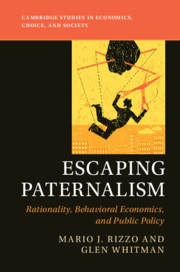Book contents
- Escaping Paternalism
- Cambridge Studies in Economics, Choice, and Society
- Escaping Paternalism
- Copyright page
- Contents
- Figures
- Tables
- Preface
- 1 Introduction
- 2 What Is Rationality?
- 3 Rationality for Puppets
- 4 Preference Biases
- 5 The Rationality of Beliefs
- 6 Deficient Foundations for Behavioral Policymaking
- 7 Knowledge Problems in Paternalist Policymaking
- 8 The Political Economy of Paternalist Policymaking
- 9 Slippery Slopes in Paternalist Policymaking
- 10 Common Threads, Escape Routes, and Paths Forward
- References
- Index
6 - Deficient Foundations for Behavioral Policymaking
Published online by Cambridge University Press: 02 December 2019
- Escaping Paternalism
- Cambridge Studies in Economics, Choice, and Society
- Escaping Paternalism
- Copyright page
- Contents
- Figures
- Tables
- Preface
- 1 Introduction
- 2 What Is Rationality?
- 3 Rationality for Puppets
- 4 Preference Biases
- 5 The Rationality of Beliefs
- 6 Deficient Foundations for Behavioral Policymaking
- 7 Knowledge Problems in Paternalist Policymaking
- 8 The Political Economy of Paternalist Policymaking
- 9 Slippery Slopes in Paternalist Policymaking
- 10 Common Threads, Escape Routes, and Paths Forward
- References
- Index
Summary
The policies recommended by behavioral paternalists rest on certain posited empirical facts or regularities about human behavior. Some of these supposed facts have not been established with much confidence. Specifically, psychological findings are highly context-specific, and thus lack the generality required for policymaking; generalizing quantitative results from the laboratory to the real world is unreliable; most existing research does not account adequately for incentives and learning; most existing research does not consider small-group debiasing; and most existing research does not adequately assess self-regulation and self-debiasing. Establishing reliable answers to these questions is a prerequisite for crafting and calibrating paternalistic policies with a reasonable expectation of improving welfare.
Keywords
- Type
- Chapter
- Information
- Escaping PaternalismRationality, Behavioral Economics, and Public Policy, pp. 190 - 234Publisher: Cambridge University PressPrint publication year: 2019

